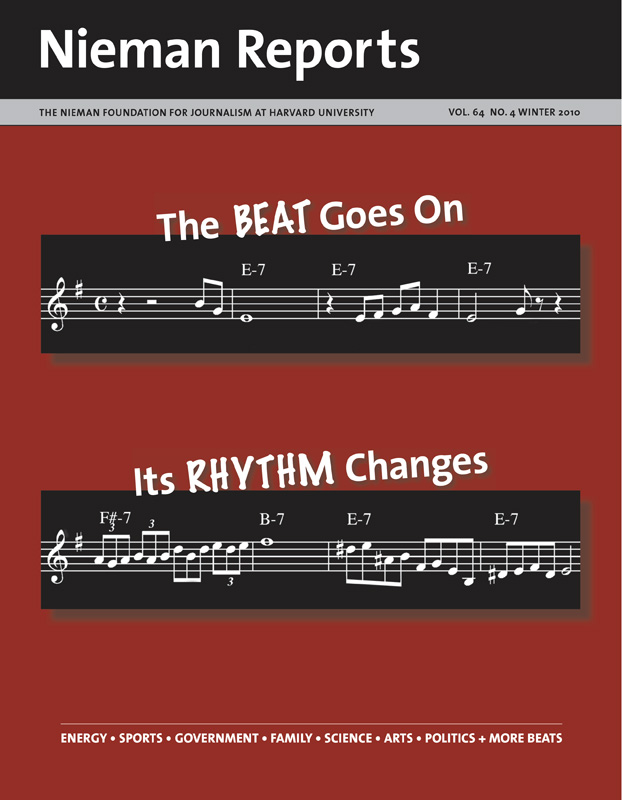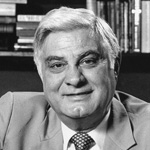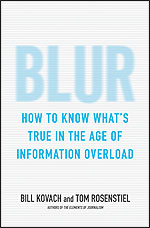In their new book, “Blur: How to Know What’s True in the Age of Information Overload,” Bill Kovach and Tom Rosenstiel, who previously partnered as the authors of “The Elements of Journalism,” explore the evolving relationships, responsibilities and roles of journalists and news consumers in the digital age. In their concluding chapter—“What We Need from the ‘Next Journalism’”—Kovach and Rosenstiel describe “eight essential dimensions or functions that the new news consumer requires from journalism.” With permission, we are presenting an adapted version of their words.
The news has become unbundled from the news organization. We seek the news today, in effect, by story rather than by news organization. As we hunt for news on our own, instead of relying on what a news gatekeeper provides in a single newscast or newspaper, news consumption has become a more proactive experience. Some have even come to call it a “lean forward” experience, in which we look for things we are interested in—for answers to our questions. Getting the news is no longer a “lean back” experience, in which we put our feet up and have an anchorperson tell us what’s happening or flip through the newspaper. This shift away from relying on one news organization to be our primary news provider is the real meaning of the breakdown of the gatekeeper role.
What those who want to provide the news must understand is that this new lean-forward consumer requires a new kind of journalism. In the broadest terms, journalism must shift from being a product—one news organization’s stories or agenda—to being more of a service that can answer the audience’s questions, offer resources, provide tools.
The important idea is this: In the future the press will derive its integrity from what kind of content it delivers and the quality of its engagement, not from its exclusive role as a sole information provider or intermediary between newsmakers and the public. To do this, newspeople must replace the singular idea of the press as a gatekeeper with a more refined and nuanced idea based on what consumers require from the news—particularly reportorial news, rather than commentary and discussion. We see eight essential dimensions or functions that the new news consumer requires from journalism:
Authenticator: We will require the press to help authenticate for us what facts are true and reliable. While we will not look to journalists as our sole information provider, we will need some way of distinguishing what information we can trust and some basis in evidence for why that is the case. Playing this authenticator role, however, will require a higher level of expertise from newsrooms, particularly on their franchise subject areas. It will also require that journalists provide this information with more RELATED SPECIAL ISSUE
“The Elements of Journalism,” an earlier book Kovach and Rosenstiel wrote about nine key principles, inspired a special issue (PDF) of Nieman Reports in which journalists wrote about the principles through the prism of their experiences.documentation and transparency about sources and methods than they may have in the past. The authenticator role will be a critical one at the heart of any news organization’s authority and a key element of remaining relevant when such organizations no longer have a monopoly over information or our attention.
Sense Maker: Journalism is also well suited to play the role of sense maker—to put information into context and to look for connections so that, as consumers, we can decide what the news means to us. The reason this role is becoming more important is precisely because information has become more plentiful. When information is in greater supply, knowledge becomes harder to create because we have to sift through more data to arrive at it. Confusion and uncertainty are more likely. That is why, in part, the journalism of affirmation has become more popular. But reinforcing prejudice, retreating to the familiar, is a false way of making sense, a retreat from learning. The sense-maker role is not a commentator role necessarily. It is reportorial. It involves finding facts and information that, as good sense making does, makes the tumblers click.
Investigator: Journalists also must continue to function as public investigators, in what many call the watchdog role. Journalism that exposes what is being kept hidden or secret is so central, so essential, to a democratic government that its importance is fundamental to the new journalism as well as the old. And some elements in our media culture are less likely to provide it, precisely because it is fundamentally a reportorial function grounded in verification. We do not see much of it in the fast-paced journalism of affirmation or the interpretative and propagandistic partisan-audience-pandering of the journalism of assertion. It is less likely to come from a blogger largely offering opinion. The press stands as an independent prosecutor of sorts, and by the power of its searchlight, it shapes, not simply follows, agendas, whether it is uncovering public malfeasance in an exposé or shifting paradigms.
Witness Bearer: This is the monitoring function of journalism, which is less prosecutorial than the watchdog or investigator function. There are certain things that occur in any community that should be observed, monitored and scrutinized. In this new era, a diminished press cannot be everywhere. So a critical step, at minimum, is to identify those places in a community that must be monitored for basic civic integrity and to show up, and by having a presence, tell those in power they are being watched. If resources do not exist, then the press must find ways to create and organize networks of new technology and citizen sentinels to ensure that this monitoring occurs. Here lies a potential for the creation of new partnerships with citizens, new bonds that can energize communities. If the press does not help create these, it is possible that more self-interested groups will fill this space to control the information flow about critical points.
Empowerer: It is about mutual empowerment—journalists and citizens. The citizen is empowered by sharing experience and knowledge that informs others—including the journalist. The journalist is empowered by tapping into experience and expertise beyond his or her formal and official sources. It starts with recognizing that the consumer or citizen is a powerful partner in this process, someone to be listened to and helped, not lectured at. The end result of this is a continuing conversation.
Smart Aggregator: We need a smart aggregator that patrols the Web on our behalf and goes beyond what computer algorithms or generic aggregator websites can offer. The idea of the “walled garden,” in which a news organization offers only its own reporting, is over. Smart aggregators should share sources they rely on, the stories they find illuminating, and the information that informed them. In the same way that the press is an authenticator and a sense maker, the aggregation it engages in should save people time and steer them to trusted sources.
Forum Organizer: A community’s news institutions, new or old, can serve as public squares where we citizens can monitor voices from all sides, not just those in our own ideological affinity group. If newspeople imagine that their goal is to inspire and inform public discourse, then helping organize this discourse is a logical and appropriate function. We all have a primary vested interest, as well, in this public forum being built on a foundation of accuracy. There is little value in arguments based on pseudo-facts and rumors. Reportorial news institutions are well suited to build a public forum on reliable information.
Role Model: The new press, especially those tied to legacy brands, if they survive, will inevitably serve as a role model for those citizens who want to bear witness themselves and operate at times as citizen journalists. Inevitably people will look to journalists to see how their work is done, emulating what they see and like and altering what they do not like. Some news organizations have gone so far as to set up classes for citizen journalists and to enlist them in their newsgathering. We applaud that. But we also need something more than that. Journalists must understand that their conduct is public, not just their stories.
Virtually all of these functions have existed previously. But now they must become more dynamic. It is not enough for news operations to simply have a story each day on what they consider the most important subjects. They need to understand what purpose each story serves for the audience, what service it provides or questions it answers. If it offers no service, it is a waste of resources and time to a more demanding proactive news consumer. A story of limited or incremental value is a sign that the news operation is not offering much service.
Journalism, in other words, is not becoming obsolete. It is becoming more complex.




